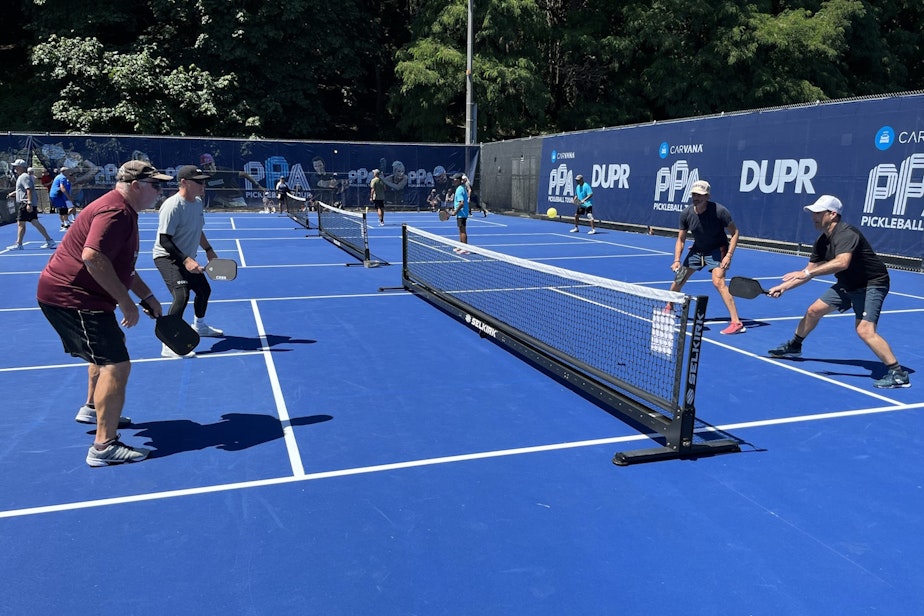Pickleball is growing. Is Seattle ready?

Seattle just hosted the All Star Game and Taylor Swift. But this week, another big event is drawing a crowd.
It’s a pickleball tournament called the Seattle Open.
Pickleball was invented on Bainbridge Island, and it’s become the fastest growing sport in the country.
The tournament has exposed strong opinions about how to accommodate all the new players.
P
ickleball is a multigenerational game.
On the one hand, it attracts older athletes like Julie Farrenkopf. She start playing the game after knee surgery.
“And a friend got me out to start playing to rehab to get back to tennis, and I never got back to tennis," she says. "At the end of that two-hour session, I called my husband and said, ‘You’ve got to order me a pickleball paddle online. I need it right now.’ And that was it.”
On the other hand, the sport also attracts younger players who hope to stand out in such a new sport. Ernesto Russo is a buff Italian player now living in Venice Beach, California.
Sponsored
He rocks a mullet with bleached tips and has a reputation for screaming during his matches.

“You know, I’m kind of like a bad guy on the tour, and a lot of people recognize me for that,” he confesses.
A bad guy?
Russo says he plays like every point is the last point of his life. He disputes the referee calls, works the crowd. But sometimes the passion follows him off the court.
Sponsored
“Yeah, I really lost my sponsorship in Dallas for an episode outside the court,” he explains.
He says he yelled at a heckler, but did not get physical.
“I wanted to tell him that that was not cool, what he did," Russo says. "But in an Italian way, you know.”
T
he Seattle Open tournament was set to be Pickleball’s triumphant return to the place where the sport was founded. It's one of several qualifying tournaments by which amateurs can earn a "golden ticket" to play in the nationals in Dallas later this year. Pros show up too, in hopes of raising their rankings.
Sponsored
But then a month ago, the tournament planning hit a bump. The tennis facility where organizers had planned to hold it had cracks in the foundation. The surface wasn’t fit to play on, and would have cost too much to repair on short notice.
So the organizers changed the venue, and moved some of the amateur slots to an earlier day. That really screwed up some people’s travel plans.
“So we had to change our airfares, we had to change our accommodations," says Kevin Ching, who traveled from San Jose. "It just was more costly." Ching had to take extra days off work to make his new time slot.
Was it hard for him to make those adaptations?
“Well, we love pickleball, so we just made them,” he says.
Sponsored

With the eyes of so many pickleball fans on this tournament, the Professional Pickleball Association wanted to make things perfect.
They paid to resurface some tennis courts near Greenlake and painted them with pickleball court lines.
You can fit four pickleball courts on a full-sized tennis court. And the games are as short as 15 minutes, so a lot more people can play pickleball than tennis in the same amount of space.
But the organization must convert these courts back to tennis after the tournament, kind of like Cinderella when the clock strikes midnight.
Sponsored
That really cheeses off local players like Edward Roque. “We have too many players, not enough courts,” he says.
Players from other places have also noticed.
“I understand it gets cold here," says Michael Wescott of Florida, who drives a recreational vehicle from place to place, playing pickleball wherever he goes. "But I was in Denver: lots of permanent courts. And that’s a cold place. Jackson Hole, just outside the Tetons: lots of permanent courts. Even when I was in Glacier National Park, I was still able to find permanent courts.”

Ogie Olanday sits in the bleachers watching his friends compete on the pristine blue pickleball courts.
“I mean, we don’t have these," he says. "This is such a waste, after seven days they’re gonna take this out. Twenty-four courts? Spending a hundred thousand? I mean, come on. That’s just. I mean, we definitely need courts. Seattle, birthplace of Pickleball, and we have nothing.”
The Professional Pickleball Association wouldn’t say how much the conversion cost.
A spokesperson for the Seattle Parks Department says the courts near Greenlake are some of the few that meet official tennis standards, so they’re going to remain as tennis courts.
But the shortage of courts has created a sort of turf war between tennis players and pickleball players. City officials have been meeting with each side to determine how to accommodate both.
Mayor Bruce Harrell has promoted an idea for an amateur sports facility to enliven downtown Seattle that would include multiple floors of pickleball.
Meanwhile, more and more athletes are picking up pickleball, in part because it’s so inclusive.

“I think it’s cool that no matter the age, we can share the same passion for the sport. I get to meet people from different generations," says pro player Sharienne Ricardo. "And you get life advice and stuff from them too.”
What’s some of the most meaningful life advice she's gotten from an older player she's played against?
“Enjoy while you’re young," she says, laughing. She probably gets that one a lot.




